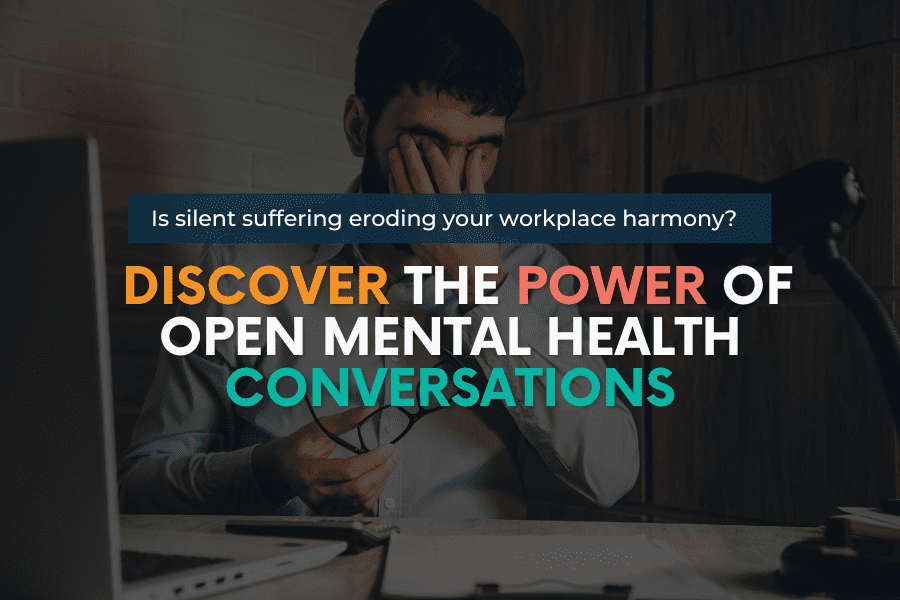Chamber News
Follow Us
DISCOVER the power of open MENTAL HEALTH conversations!

Breaking the stigma: encouraging open conversations about mental health in the workplace
Amid the challenges of today’s work culture, mental health remains just as important as physical health—yet conversations around it often remain hushed. As we recognise World Mental Health Day, it’s time to address the stigma surrounding mental health in the workplace and encourage open dialogue. By creating a culture of support, businesses can improve employee well-being while increasing productivity and morale.
The stigma surrounding mental health in the workplace
For years, mental health has carried an unfair stigma, especially in professional settings. People often fear that sharing their mental health struggles will be seen as a weakness, or worse, affect their careers. This stigma can lead to employees staying silent about stress, anxiety, or depression, which not only worsens their condition but also creates a ripple effect of lowered productivity, absenteeism, and higher turnover rates.
According to a recent study, many employees are uncomfortable disclosing mental health challenges at work, and the majority feel their employers lack interest in their well-being. This highlights a critical issue: many employees are suffering in silence. The longer these conversations are avoided, the more damaging the effects can be on both the individual and the business. It’s time to change this narrative and break the stigma for good.
The importance of open conversations
Creating an environment where employees feel comfortable discussing mental health issues is essential for several reasons. First, it reduces the feeling of isolation. Mental health challenges often make people feel alone, and knowing that they can talk openly with managers or colleagues can make a significant difference.
Additionally, open conversations develop a sense of trust within the workplace. When employees feel supported, they’re more likely to seek help before their issues escalate. This results in improved mental well-being, lower stress levels, and a more positive work environment overall. For employers, these conversations lead to better engagement, higher productivity, and reduced absenteeism. It’s a win-win situation.
How to encourage open conversations about mental health
Creating an open dialogue about mental health doesn’t happen overnight, but there are several steps businesses can take to build this kind of environment.
- Lead by example:
Leadership plays a major role in setting the tone for the workplace. When leaders openly discuss mental health or share their own experiences, it breaks down barriers for others to do the same. Leaders can normalise these conversations by speaking at company-wide meetings or sending messages encouraging mental well-being. - Train managers and employees:
Providing mental health training helps everyone in the company understand the importance of well-being and how to address it. Managers, in particular, should be trained to recognise signs of stress or mental health struggles and have the tools to support their team members effectively. - Regular check-ins and peer support:
Encouraging managers to check in with employees on a regular basis can help create a culture where mental health is regularly discussed, not just when problems arise. Additionally, peer support networks allow colleagues to support each other in a non-judgmental way. - Promote resources:
Make sure your employees are aware of any mental health resources your company provides, such as employee assistance programs (EAPs), counselling services, or mental health days. It’s not enough to have these resources available—they need to be actively promoted and encouraged.
Building a culture of support
Creating a supportive workplace goes beyond encouraging conversations. It requires long-term commitment and policies that reflect the importance of mental well-being.
Ongoing initiatives: Keep mental health as an ongoing priority. Introduce workshops, webinars, or even informal mental health awareness activities to continue the conversation throughout the year. It should be a regular part of the company culture, not just a one-off event.
Flexible policies: Flexible work hours, mental health days, and access to professional mental health services can provide the practical support employees need. These policies show employees that their well-being is valued and that they don’t have to sacrifice their mental health for their job.
Measure success: Gather employee feedback about how mental health initiatives are working and make adjustments based on their input. This will help you refine your approach and make sure your workplace continues to support its people effectively.
Final thoughts
Breaking the stigma surrounding mental health in the workplace creates an environment where everyone feels valued and supported. By encouraging open conversations, providing resources, and building a culture of support, businesses can positively impact both their employees and their bottom line.
This World Mental Health Day, take the opportunity to start or reinforce mental health initiatives within your organisation. Open dialogue is the first step toward a healthier, more engaged, and more productive workplace.
By attending local events and learning how to network effectively, you can position your small business for continued success and growth.
Not currently a Maitland Business Chamber member? Discover the benefits here.













